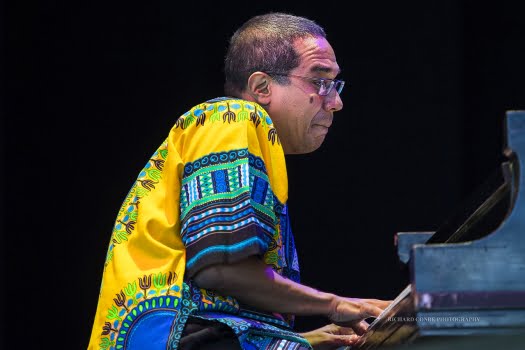Pianist, composer, humanitarian and activist Danilo Pérez believes that a united global perspective for the arts and social justice are the keys to moving humanity forward in harmony.
With Crisálida, Pérez has convened his Global Messengers – several gifted Berklee Global Jazz Institute graduates mentored by Danilo hailing from Palestine, Greece and Jordan — to contribute their respective cultural learnings and personal experiences with the goal of building community through music, without borders.
Wayne Shorter, whom Danilo Pérez calls his mentor, told the pianist “to write and play music the way you want the world to be.” If Crisálida is Pérez’s response, then he sees a world that is in a state of becoming: crisálida means “chrysalis” in English. Judging from these alternately questioning and hopeful pieces, performed by an international band and drawing on various traditional musics, Pérez’s vision of creativity is inspired by the possibility for international cooperation and harmony. He is interested in how music might shape our future: “We believe music has the power to protect us during this early stage of development and project light and positive vibrations through the Glass Walls.” His musicians come from Palestine, Greece, Jordan, USA, Chile, Cuba, and Panama.
In part commissioned by the Detroit Festival of Jazz, Crisálida is comprised of two suites: “La Muralla” (Glass Walls) and “Fronteras” (Borders). The instrumentation varies somewhat but typically it includes — besides the piano of the leader-composer — a Greek laouto (lute), violin and cello, an occasional flute, vocalists who sing and speak in various languages including Greek (which I cannot translate) and dozens of percussive instruments, including the batá. The lyrics question rather than proclaim. The “Glass Walls” suite begins peacefully, with a splash of color from Peréz’ piano. The “Rise From Love”‘s sweet theme is then stated by Farish Ishaq on the Turkish ney flute, and then by Naseem Alatrash on cello. The colors and instrumental shadings generated by this band is probably unprecedented, as we hear a kind of trio with piano, ney flute, and cello before the vocalist enters with a series of questions: “Is it light or dark? Or shades of grey?” “Glass Walls” ends when the cello starts repeating a phrase obsessively — a crescendo in the abyss, as it were. “Monopatia” (Pathways) begins with a beautifully expressive excursion on lauto over Pérez’s solo. We hear wordless vocals entering over the strings, and then a duet between cello and violin.
The most cheerful sounding piece is “Calling for the Dawn,”.which is introduced by the lively percussion of Tareq Rantisi and Roman Diaz’s batá. Peréz’s melodies are genially exotic. His improvisations are tightly controlled by the form of his works, yet vigorous and invigorating. On occasion they can be genuinely touching. The composer describes Muropatia,” the final movement of the “Glass Walls” suite, as a view of “the human condition characterized by the desire to make solid impermeable walls.” He is, of course, on the side of glass walls that let the light through. Nonetheless, “Muropatia” doesn’t sound bleak: it contains one of the pianist’s longest, most exposed solos. There’s also virtuoso harmony writing for strings playing what I would have to call boppish riffs.
The theme of “Fronteras” is, of course, dark. Its opening movement, “Adrift,” is described as “a tale of a Mexican mother seeking to reunite with her daughter after 20 years apart.” Farayi Malek sings the lyrics in English. Again, the song is supported and interrupted by richly stated interjections by the cello and the rest of the band. It’s the cello that begins “Al-Mustafir Blues,” which is about “a young man from Palestine who is trying to find his way to the US to study and finally meet his birth mother.” The suite focuses on a state of yearning, and it is alternately hopeful and melancholy. The violin has an upbeat solo on what may be a Palestinian scale that becomes wild once the piano and other instruments join in. In the middle of that piece, however, everything settles down and we hear a piano solo over a repeated riff in the left hand. That movement is followed by “Kalesma” (True Calling) and, finally, “Unknown Destination.” It’s we, in Peréz’s view, who don’t know our destinations, or what we will become. His provisional answer to this mystery is embodied by this cooperative music, which is deliberately international in instrumentation and personnel and theme — and proffers its own characteristic, and often quite beautiful, mix of sounds. Albert Ayler called music the healing force of the universe. It’s even more to Pérez: it might be able to help create a more welcoming world.
1 La Muralla (Glass Walls) Suite: Rise from Love 05:54
2 La Muralla (Glass Walls) Suite: Monopatia (Pathways) 07:04
3 La Muralla (Glass Walls) Suite: Calling for the Dawn 06:55
4 La Muralla (Glass Walls) Suite: Muropatía 04:32
5 Fronteras (Borders) Suite: Adrift 03:48
6 Fronteras (Borders) Suite: Al-Musafir Blues 11:54
7 Fronteras (Borders) Suite: Kalesma (True Calling) 05:24
8 Fronteras (Borders) Suite: Unknown Destination 04:23







More Stories
CD review: George Benson – Dreams Do Come True: When George Benson Meets Robert Farnon – 2024: Video, CD cover
The band was tight as ever. The Warren Haynes Band cuts loose: Video, Photos
Interview with Alvin Queen: Feeling Good – I heard these tunes played by … Video, new CD cover, Photos